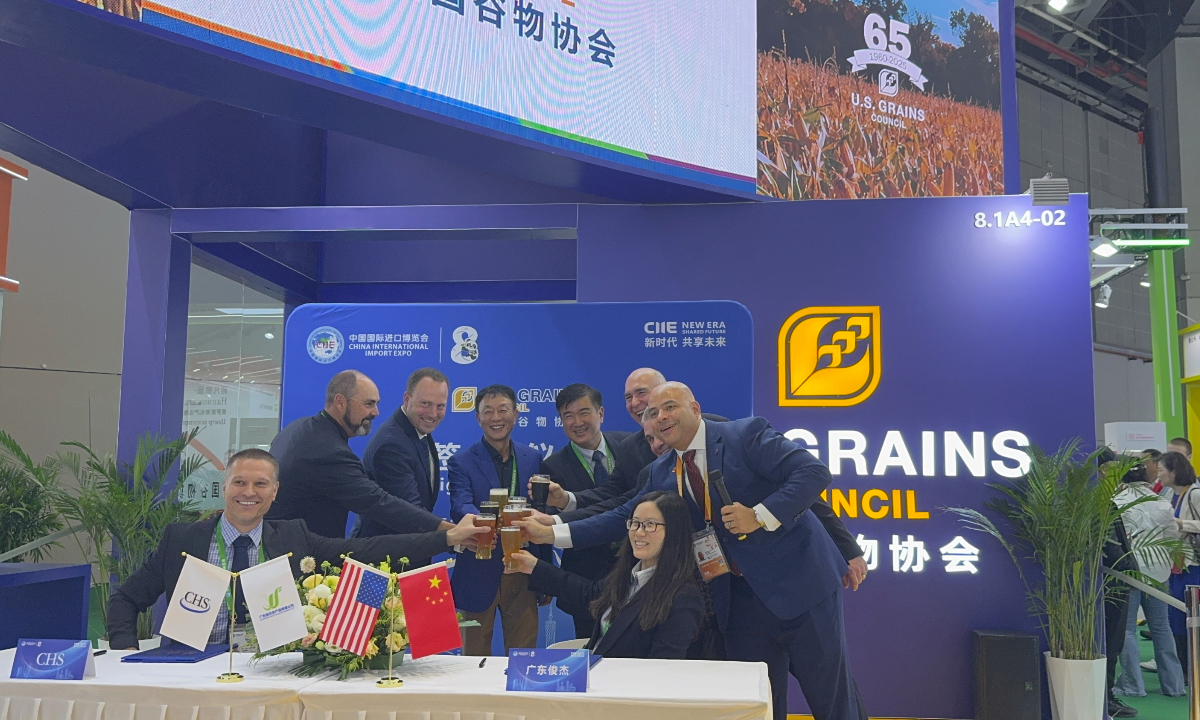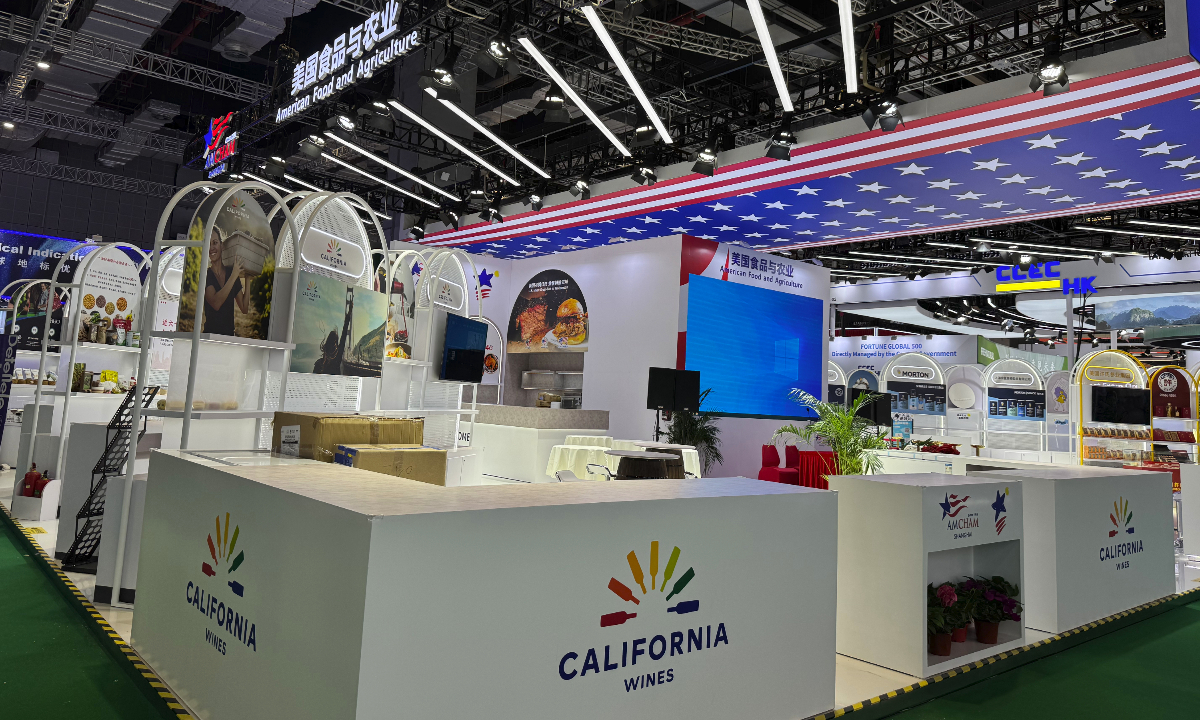(来源:《环球时报》,2025-11-08)

Executives from the US Grains Council, American agribusiness, and a Chinese agricultural firm raise their glasses to celebrate a newly signed orders at the 8th China International Import Expo in Shanghai on November 6, 2025. Photo: Tu Lei/GT
The US pavilion at the 8th China International Import Expo (CIIE) in Shanghai was abuzz on Thursday morning. Executives from the US Grains Council, American agribusiness, and a Chinese agricultural firm raised their glasses to celebrate a newly signed orders.
The American Food and Agriculture Pavilion, organized by AmCham Shanghai, held an opening ceremony, featuring 19 exhibitors from the US to showcase products for the Chinese market, including Wisconsin ginseng and California almonds.
In interviews with the Global Times, leaders of the American Soybean Association and the US Soybean Export Council said they hope to return to the Chinese market.
China is a crucial market for American agriculture, compelling them to come and voice their desire for cooperation, said US agricultural representatives.
Looking ahead, they hope that, following the leaders' important consensus reached during the APEC summit in South Korea, free trade can be restored.
Some good news has followed.
Starting November 10, 2025, soybean export licenses for three companies including CHS Inc will be reinstated, China's General Administration of Customs announced on Friday.
'We're not going anywhere'
Also on Thursday, the Guangdong Junjie Agriculture Trading Co and CHS Inc signed a 2026 strategic cooperation agreement at the US Grains Council exhibition booth, marking a joint commitment to advance long-term cooperation in Sino-US grain trade and enhance sustainable supply-chain development.
The deal came one day after China's decision to continue to suspend the 24-percent additional tariff on imports from the US for one year while retaining the 10-percent rate, according to an announcement by the Customs Tariff Commission of the State Council.
China will make the adjustment from 1:01 pm on November 10, 2025, the commission said.
According to an earlier announcement issued in March, China had decided to impose an additional 15-percent tariff on imported chicken, wheat, corn and cotton originating from the US. Sorghum, soybeans, pork, beef, aquatic products, fruits, vegetables and dairy products were subject to an additional 10-percent tariff.
"That's a sign that things are moving forward. We want to continue to have more talks, and hopefully we can get this thing resolved. So we can go back to normal trade," said Mark Alan Wilson, chairman of the US Grains Council.
"I'm here [in CIIE] to help build relationships, help keep the friendships that we've had over the last 43 years. Grow on that and keep reminding people that we're here. We didn't fall away. We're not going anywhere. We're going to be here," he added.
He said one shipment of sorghum has been loaded and is en route to China. "Hopefully, that's a good sign that will continue to see more," he added.
In China's sorghum import trade, the US has consistently been a crucial partner. Data from a research center under the Chinese Academy of Agricultural Sciences showed that through the end of 2024, except for a few years, US sorghum has accounted for over 60 percent of China's total sorghum imports annually.
Wilson said that he hopes that they can get back to normal on sorghum, because "that's the No. 1 thing that we're missing."
The CIIE opened with a strong show of US-China cooperation as the American Food and Agriculture Pavilion, organized by AmCham Shanghai, celebrated its official launch. Covering 350 square meters and featuring 19 exhibitors, this year's pavilion marks the largest US agriculture and food showcase in the CIIE's history, underscoring the enduring interest of American brands in China's market, according to the official website of AmCham Shanghai.
Hsu's Ginseng Enterprises Inc, an agricultural company based in Wausau, Wisconsin, specializes in cultivating and selling American ginseng.
Founded in 1974, the company operates more than 400 hectares of land and employs over 70 staff. Its founder Paul C. Hsu told the Global Times that the company's sales in the Chinese market had declined by about 50 percent over past period due to tariffs and other factors.
"A 50 percent drop makes it very hard to survive. It's hardly enough to cover the costs, and the prices have also fallen by nearly 30-40 percent," Hsu said. "The tariffs have been detrimental to all US agricultural products."
He noted that Wisconsin is also a soybean-growing region. "Many families have their grain bins filled with soybeans. It's the same for us ginseng growers — some haven't been able to sell their stock from the past two to three years. After the tariffs increased, there has been a noticeable impact on American ginseng exports to China."
"China and the US are two major countries. Peaceful coexistence is highly beneficial for future trade, and not just trade alone," he said.
Hsu, who was born in Taiwan and is now in his 80s, last visited the Chinese mainland in 1981. His decision to attend the CIIE this time was driven by his personal commitment to promote his products and expand exchanges between the two sides.

The US pavilion at the 8th China International Import Expo in Shanghai on November 5, 2025 Photo: Tu Lei/GT
'Ideal opportunity"
At the American Food and Agriculture Pavilion, the exhibition counter was stocked with a wide array of wines from California. Staff invited passersby to sample them.
"It's nobody can be serious about exporting wine if they don't think about China," Christopher Beros, Southeast Asia and Greater China Director at the California Wine Institute, told the Global Times.
Beros said he entered China's wine industry in 2007 and has witnessed numerous changes. "Currently, many local Chinese wines are becoming increasingly popular, which actually helps promote premium California wines as well. I consider the Chinese market to be extremely important and dynamic, with enormous potential," he said.
He said the association has approximately 1,000 wine merchant members, and his purpose was to raise awareness of California wines in this crucial market.
"Right now, a lot of Chinese wines are becoming very popular. I think that actually helps find important wine too," he said. "The Chinese market is very important and very dynamic market. I think that the potential of the Chinese wine market is enormous."
This is Beros' third time at the CIIE, which is a major exhibition that his institute wants to be involved.
The Global Times found the reason that senior executives of US agricultural associations attended this year's CIIE in person is to demonstrate their respect for and commitment to the Chinese market, and to reclaim their former trade prominence.
Garrett Borkhuis is a vice president of Trade and Technical Services for the USA Poultry & Egg Export Council, a trade association that represents the export interests of the US poultry industry including chicken, turkey, duck and egg producers.
"We do export to more than 130 countries around the world. China being a primary market for us poultry, primarily the chicken paw is a product that is highly priced here in China… We are very grateful the cooperation between China and the US, to have that avenue to send our chicken paws here," he said.
Robert Kaldunski, president of the Ginseng Board of Wisconsin, was engaged in discussions with visitors. A ginseng farmer with an experience of more than 40 years, he noted that 98 percent of the US American ginseng is produced in Wisconsin, and 80 percent of Wisconsin's ginseng is exported to China.
The concentrated visits by US agricultural representatives present an "ideal opportunity," said Song Guoyou, a deputy director of the Center for American Studies at Fudan University.
He noted that the CIIE aims to expand imports, while the recent meeting between the heads of state in Busan, South Korea produced consensus on bilateral trade, with agricultural imports being a key component.
"With the year-end approaching, US agricultural products urgently need to find buyers; otherwise, significant losses could be incurred," he added.
In a latest development, China's Ministry of Commerce on October 30 unveiled outcomes of recent economic and trade talks between the Chinese and US delegations in Kuala Lumpur. A ministry spokesperson said that the two sides also reached consensus on expanding agricultural trade.
Li Chenggang, China international trade representative and vice minister of commerce, said during a meeting with a US agricultural trade delegation in Beijing on Tuesday that sound China-US economic and trade relations benefit not only both countries but also the world, according to a ministry statement.
Since May, the two sides have held five rounds of talks under the strategic guidance of the leaders' consensus, helping stabilize trade ties. This demonstrates that guided by the principles of equality, mutual respect, and reciprocity, China and the US can find solutions through dialogue and cooperation, Li said.
"We cherish the market here, and we want to continue to build relationships and build friendships. So in the future, we can bring more products over here," said Wilson, the US Grains Council Chairman.
"If we can keep the communication going between our countries, keep the talks going, things are bound to get better," he said.

